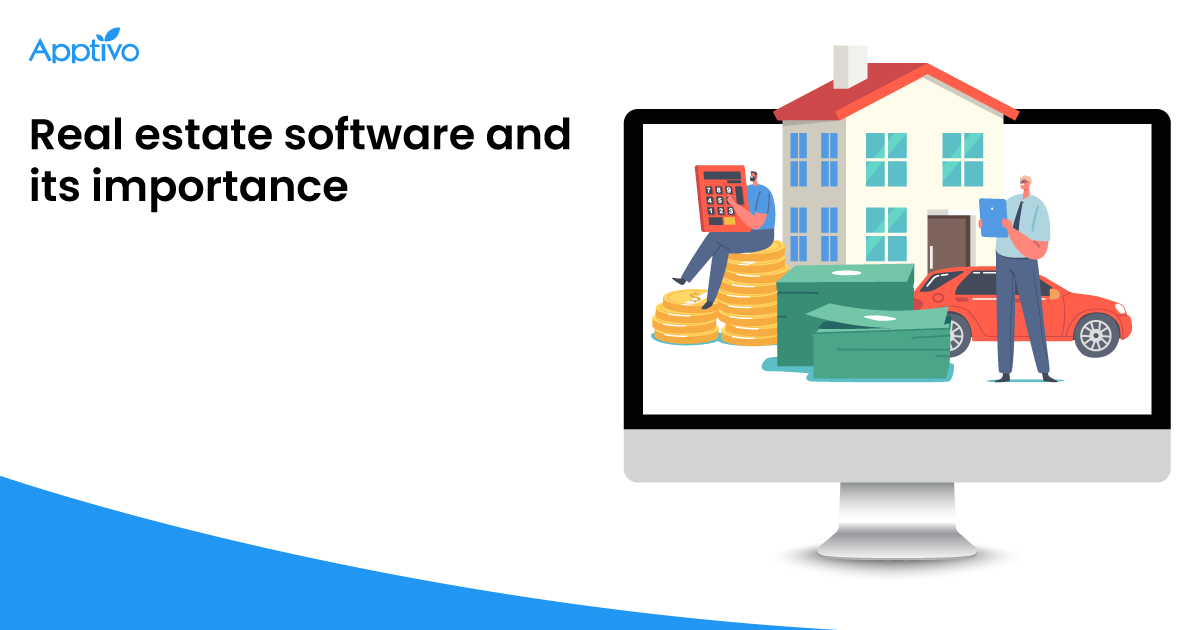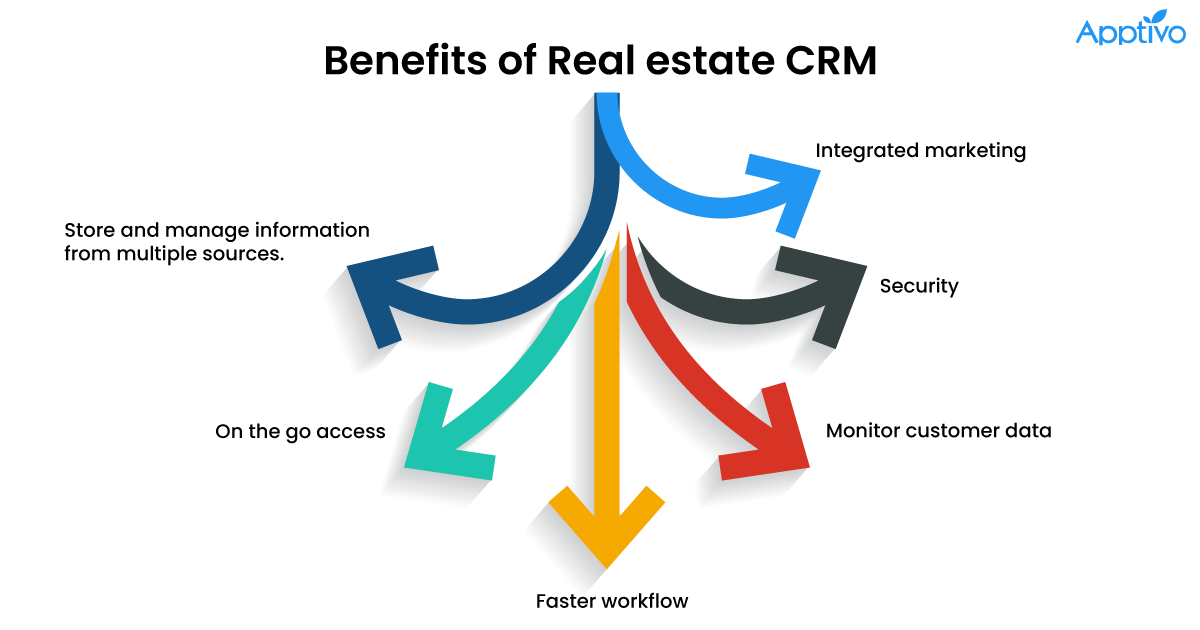 |
Real estate is a business based on trust and loyalty, and it is to be noted that more than 80% of new sales in property businesses come from referrals either through friends, family members, existing clients, current contacts, relatives, and peer groups. In real estate businesses, selling and buying usually is a tediously long process, which involves multiple negotiations and follow-ups. Implementing a CRM for real estate businesses will help realtors in a great way. With the best real estate CRM in place, you will be able to manage your clients and contacts, schedule events, get reminder alerts, monitor sales pipelines, organized data management, and much more which will help you close deals faster than ever before.
All About Real Estate CRM
1. What is real estate CRM software?
2. Importance of real estate CRM for realtors
3. Benefits of using CRM in the real estate business
4. How CRM works in real estate?
5.How to set up a real estate CRM?
What is real estate CRM software?
Real estate CRM software is a solution that helps coordinate and manage effective relationships among buyers, sellers, developers, banks, third-party agents, and brokers. You can manage everything related to the business inside your CRM system. Say, you can prepare quotes based on the requests, manage your property details, and address the needs and requirements of the real estate agents. The real estate CRM software helps you streamline the entire end-to-end process and manages it effectively for outstanding results.
Importance of real estate CRM for realtors
Real estate property management software building trust and relationships with prospective customers rather than just closing deals. You can increase your sales by widening your contact base, such as referrals, client details, friends, family, and relatives. Also, you can use real estate lead services to automate this process and save time and effort. Real estate is a complex business, but with the right tools, you can close deals faster and grow your business. Real estate is a complex business where buying and selling take a lot of time and effort. You need to continuously follow up and negotiate in order to close the deal.
Real estate CRM comes to play in such scenarios. It helps realtors to perform their functions smoothly and streamline their business operations. You can manage the contacts, monitor the pipeline, schedule the tasks and organize the information. Real estate can close their deals faster and grow their business if they invest in a CRM system.
Benefits of using CRM in the real estate business
CRM for realtors software saves a lot of effort, time, and resources by automating almost every process inside your system. You can automate sales, lead management, contacts management, email, customer data, and all other important workflows. Listed below are some of the benefits of using CRM in the real estate industry.
 |
1. Store and manage information from multiple sources:
CRM for real estate agents helps organize and manage information gathered from multiple sources. The buyers use a lot of applications, and sign for newsletters, and CRM plays its role by bringing those leads into the system. It further helps categorize unstructured customer information and inputs it into a holistic database which would provide deeper insights for the industries to develop their strategy.
2. On the go access:
The office brokers and on-the-go agents need to access information on the go. They need to be omnipresent in order to negotiate with new leads, discuss with the clients, visit properties, and market their plots and advertising in the media. CRM provides the realtor access to the cloud database with a user-friendly seamless interface across synced devices. With advanced geolocation technologies, CRM provides efficient location-based marketing which is one of the prominent features.
3. Faster workflow:
Realtors need quick responses to accelerate the business to the next level. Real estate people can leverage the data from CRM and manage to present the appropriate business proposals to potential clients. While real estate is a very competitive industry, realtors need to make sound informed decisions based on CRM data.
4. Monitor customer data:
CRM provides access to the customer data and based on that data you can analyze and forecast future sales based on past customer experience and historical data. You can easily track and monitor the customers’ behavior and predict their demands and queries by checking out the applications, email campaign performance, social media, and such. Maintaining your past real estate buyers and reaching out to them, so as they act as referrals or brand advocates for your real estate business.
5. Security
The real estate sector has huge chunks of client data that need to be secured. The cloud-based realtor CRM provides you with all the security features to ensure that there is no data theft. The cloud servers ensure that data has been stored and is encrypted and alert if there are any phishing or malware attempts.
6. Integrated Marketing
CRM solution with marketing automation helps the realtors to amplify the marketing and sale of their property in a better way. CRM provides the marketing capabilities that track the campaign performance and email interactions. This helps in targeted marketing and you can profile your customer details, which will be helpful in reaching out to them. CRM along with marketing integration provides an understanding of which channels perform well with targeted accounts.
How CRM works in real estate?
1.The right CRM will help realtors with routine task management and enable them to keep track of leads.
2.The real estate agents can keep the data of clients and property details in an organized way, which can be easily accessed whenever necessary.
3.The CRM system can be integrated with your website which stores the availability of the property details and reflects it on the website, whenever a booking is made.
4.You can have follow-ups with the clients throughout the buying process.
5.Remote agents can manage and access the software that is hosted in the cloud from their mobile devices.
6.You can prioritize and nurture the leads based on the sales stages.
7.Check the email campaign performance to check if leads are interested in your deals.
How to set up a real estate CRM?
1. You can customize your CRM software if a lead enters your funnel
You can collect the details of the leads that are coming in, and input all their requirements and demands to provide the best service. Say suppose, the leads are looking for a property near a school, or they have a limited budget, or they are demanding a number of rooms.
It will get easier for you to look into properties that interest them just because you know their needs and what they are looking for. If you track each and every piece of information, you will not lose the opportunity to slip through the cracks.
2. Follow up – Follow up – Follow up
As leads start pouring in, you need to follow up with them, you need to welcome them with your appealing behavior and you have to know what they are looking for and explain if you have any property related to their requirements. As you keep following up with the prospective buyers, there is a good chance of them moving into the next step of the funnel.
3. Enter Property related details
You need to make a list of the potential properties and enter the information about the property and its value into your CRM system. Your CRM system will remind you about the next action to be made. Also, CRM will input all the property-related details and if a property is in sync with the buyer’s interest and needs, your CRM software will send you alerts.
4. Make calls to the right buyers, at the right time
If your property matches the interest of the prospective buyer in the pipeline, you need to call him/her to explain this property. The CRM software will send you notifications about the property details and the contact to whom you should make the call. You can thus leverage this information to further move the leads down your pipeline.
5. Negotiation phase
The seller needs to keep track of how the deal is progressing from one stage to another. Now when it’s time to close the deal, CRM provides you with data to respond during the negotiation phase, you can set up inquiries, discuss the property, arrange meetings and track the end result. Once they are happy with the deal, you can carry on the paperwork procedures.
6. Getting the paperwork done
The paperwork is the crucial and tedious phase of the process. You need to explain the information included in the paperwork and discuss the terms and conditions with the buyers.
You can create documents and templates with the real estate CRM software and you can use e-sign integration to sign the papers electronically. You can now finally update the CRM software as you have moved the buyer to the end of the sales funnel.
Who can use Real Estate CRM?
Many industries use real estate CRM to track their prospects, fix appointments, and secure deals. You can keep things going on based on the data from the real estate CRM.
Hospitality Industry
Customers can book the hotels based on needs and requirements. Your system retrieves data from the CRM software letting the customers know if the property they wish to rent is available or not. You can access all the important metrics and updates from the homepage itself and can use that to run your real estate agency.
Property/Housing Industry
You can manage both residential and commercial properties for sale and Rent. Also, upload the images of each property and list them based on the location. You can sync properties from your CRM software directly to your website. CRM updates your website and marks the property as ‘featured property.’ Real estate CRM also lets you manage the entire sales cycle and you can keep track of the leads throughout the sales stages.
Corporate Industry
If you need a corporate property, Real estate CRM provides the prospects with property recommendations. CRM captures the requirements of the prospects and it will find the matches available on the property list and generates the recommendations. You can also capture the incoming inquiries and nurture the leads to move them down the funnel. Sellers can also submit the details of the properties via web forms. The information will go straight to the properties module, where you can mark the status of the property.
Final thoughts
Just like finding the right property for your buyer, it is very important to find the right CRM software that will work best for your business. Not every CRM is suitable for the real estate industry. You will find the solution too complicated for the real estate work or might find useless collaborations that might slow down your job. A CRM that is built with the purpose of managing the real estate processes will not create confusion. Apptivo is the best software available in the market that streamlines the real estate functions smoothly and helps to finish your tasks quicker and easier with no hassles thereby increasing revenue.
A CRM for the real estate industry is software that is designed to manage and build relationships among buyers, agents, sellers, brokers, and developers. It caters to the needs and requirements of the real estate agents and firms.
Top realtors use Apptivo CRM software. Apptivo helps deliver extraordinary customer experiences and allows closing deals at a faster rate. It helps provide easy data structuring, automation, and integrations and allows to build customer loyalty.
Yes, realtors use CRM. They use CRM software to manage, attract, store and retain clients. CRM helps streamline the transactions and helps to close deals on time.
Latest Blogs

Role Of CRM In Travel And Tourism Industry
Travel and tourism have been a significant part of everyone’s life since the ancient period. When we skim through the pages of history, It should be noted that humans were initially nomads before they became settled in one place. They...
Read more →
WHAT IS CRM TECHNOLOGY?
Introduction CRM is a technology that helps manage the entire customer information and interactions in order to build and maintain superior customer relationships. The CRM solution replaces spreadsheets and other different applications, which makes it easy for the businesses to...
Read more →
Everything you need to know about the Annual Maintenance Contract!
1. What is an Annual Maintenance Contract? 2. Benefits of Maintenance Contracts 3. How can Apptivo CRM help you manage maintenance agreements and vendors? 4. Summary Think about getting the confidence that the machinery is well-maintained and performing optimally, without...
Read more →
